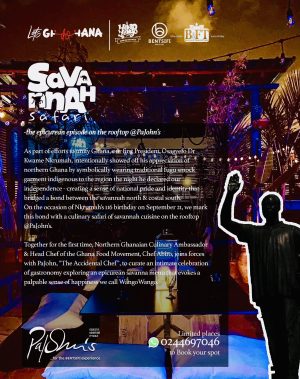
Ghana has been riding a wave of tourism success in recent years, transforming itself into one of Africa’s most attractive destinat ins.
This resurgence is no accident. Landmark campaigns such as the Year of Return in 2019 and its follow-up, Beyond the Return, have firmly posituned the country as a cultural and heritage hub.
These initiatives rekindled deep emotional connections with the African diaspora, attracted global attention and gave the economy a significant boost.
In 2019, the Year of Return drew more than one million visitors and generated close to $3 billion in revenue. For the first time, Ghana became a bucket-list destination for many African Americans, Caribbean nationals and heritage travellers. The momentum was palpable until COVID-19 brought global travel to a standstill. Tourist numbers fell sharply, and revenues dipped by more than half.
But Ghana’s tourism industry is nothing if not resilient. By 2023, the country had bounced back, surpassing pre-pandemic levels with more than 1.15 million international arrivals and tourism receipts of nearly $4 billion. December festivities branded under December in GH-have become a magnet for visitors, with tourists staying longer and spending more. The mood in the industry is upbeat.
Yet amid this progress, a persistent obstacle threatens to slow Ghana’s growth: the difficulty of securing a visa to enter the country.
The Promise of Change
Back in 2019, during the first UNWTO Regional Congress on Women’s Empowerment in Tourism hosted in Accra, then Vice-President Dr. Mahamudu Bawumia announced that Ghana would soon introduce an electronic visa system as part of the government’s digital transformation agenda. The promise was met with optimism from industry players who knew first-hand the frustrations visitors faced when trying to secure a Ghanaian
The logic was simple: an e-visa would make the process faster, more transparent and more accessible. Tourists could apply online from anywhere in the world, receive updates in real time, and avoid the inconvenience and sometimes expense-of travelling to a Ghanaian embassy. The ease of entry would naturally encourage more travellers to choose Ghana, increasing arrivals and visitor spending.
However, years passed and little progress was made towards implementing the system. Despite repeated calls from the tourism sector, the e-visa remained a concept rather than a reality.
The Cost of Delay
The absence of an e-visa system has been more than an administrative headache it has been a direct hit to Ghana’s tourism revenues. Tour operators, especially those catering to North American travellers, have repeatedly reported losing clients because of visa processing delays.
In the past year alone, inefficiencies at the Ghanaian Embassy in Washington led to serious disruptions. Passports were not returned in time, communication with applicants broke down, and visa applications stalled without updates. As a result, many travellers— especially those who had planned to visit during the peak summer holidays-were forced to cancel their trips entirely.
The fallout was severe. Some tour operators were lucky enough to have clients willing to reschedule. But for many others, cancellations meant reimbursing thousands of dollars, losing months of preparation and damaging hard-earned reputations. In an industry where timing and customer confidence are everything, the visa bottleneck has been a costly setback.
A Step in the Right Direction
There are signs of change. The current government, led by President John Dramani Mahama, has issued firm directives to the relevant ministries and agencies to expedite the implementation of an e-visa regime. The plan is to integrate it with Ghana’s new digital border management systems, ensuring a secure yet seamless entry process for travellers arriving by air, land or sea.
This is more than just an administrative upgrade it is an urgent necessity. The tourism industry is poised for even greater growth, but that potential can only be unlocked if visitors find it easy to enter the country. In an era when countries are competing fiercely for travellers, every unnecessary hurdle risks sending tourists elsewhere.
Why an E-Visa is Non-Negotiable
Faster, Easier Access – Travellers expect convenience. With an e-visa, they can apply from anywhere, anytime, without navigating the logistical maze of embassy appointments.
This is more than just an administrative upgrade-it is an urgent necessity. The tourism industry is poised for even greater growth, but that potential can only be unlocked if visitors find it easy to enter the country. In an era when countries are competing fiercely for travellers, every unnecessary hurdle risks sending tourists elsewhere.
Why an E-Visa is Non-Negotiable
Faster, Easier Access – Travellers expect convenience. With an e-visa, they can apply from anywhere, anytime, without navigating the logistical maze of embassy appointments.
Global Competitiveness – Many African nations, from Benin to Mozambique, have already embraced e-visas and seen significant increases in arrivals. Ghana cannot afford to be left behind.
Boost to Tourism Revenue – By removing barriers to entry, Ghana can attract more spontaneous travellers, including those deciding at short notice to attend festivals, conferences or family events.
Positive Perception – A modern, efficient visa process sends a strong message: Ghana is open for business, forward-thinking and ready to welcome the world.
The Way Forward
Tourism is not just about beautiful destinations— it is about accessibility, experience and efficiency. Ghana already has the scenery, the culture and the festivals that make it a dream destination. What it needs now is the digital gateway that will make visiting the country as simple as booking a flight.
The e-visa is not a luxury— it is a necessity. Every day without it is a day when Ghana risks losing potential visitors to countries that make entry effortless. With the right political will and coordinated action, Ghana could have its e-visa system running within months.

When that happens, the world will not only be talking about Ghana’s rich history and vibrant festivals they will also be talking about how easy it is to get here. And that, more than anything, could cement Ghana’s place as one of the most competitive tourism destinations in Africa.
The post MICE CAFE: E-Visa Now or Never: VoyagesAfriq’s Samuel Obeng says Ghana’s tourism boom needs a digital gateway appeared first on The Business & Financial Times.
Read Full Story













Facebook
Twitter
Pinterest
Instagram
Google+
YouTube
LinkedIn
RSS